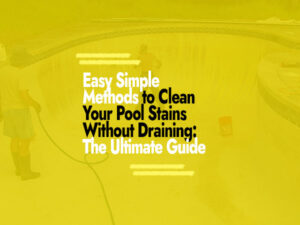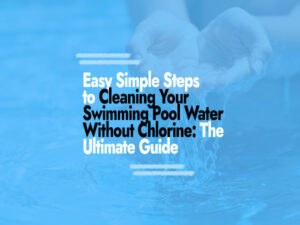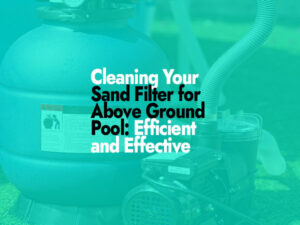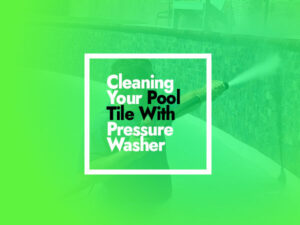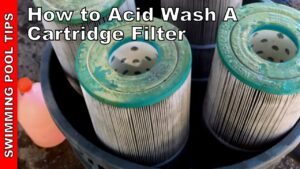As a pool owner, you understand the importance of keeping your pool clean and well-kept for both its aesthetic appeal and functionality. Even with regular upkeep efforts in place, however, problems such as chlorine buildup on vinyl pool walls may still arise. This popular chemical used for water purification may leave unsightly streaks that won’t go away with proper usage. Additionally, improper use may leave unattractive spots behind on its trail of chemicals. It leaves unsightly stains that detract from its overall aesthetic appeal.
But with the right tools and know-how, removing chlorine residue from plastic pool walls doesn’t need to be impossible. Here we explore both DIY and store-bought methods of clearing away chlorine residue from these walls as well as ways to prevent further spots from appearing in the future.
No matter the age or size of your pool, it is crucial that you know how to keep it in top condition and address any potential problems as they arise. By learning how to clean chlorine stains off vinyl pool walls, you can help ensure that it remains beautiful for years to come and still works efficiently.
What causes chlorine build-up on plastic pool walls?
Many pool owners experience chlorine buildup issues, which may be the result of many different sources. A high chlorine concentration in the pool water is one cause, when this level exceeds safe threshold levels, extra chlorine mixes with vinyl on pool walls to form a residue. It builds up over time and accumulates on plastic pool walls as residue buildup occurs.
Poor pool care is another common factor behind chlorine residue build-up in pools. When your pool is not cleaned frequently enough and has water that’s not at an appropriate level, chlorine residue can begin to build up on its walls and accumulate quickly. Furthermore, chlorine residue may form when your filter system doesn’t function as intended or your filtering system simply fails altogether.
Chlorine residue that forms on plastic pool walls can also be caused by environmental factors. For instance, when there’s plenty of sunshine around, chlorine can break down more quickly, leaving residue on its walls. Conversely, in humid environments chlorine mixes with vinyl more readily and creates residue buildup over time.
Overall, various factors can cause chlorine residue to build up on plastic pool walls and you should know what causes this. By taking steps to keep your pool looking its best and avoid potential problem spots, you can help stop this build-up and ensure the best appearance for your swimming experience.
How to Clean Chlorine Off a Vinyl Pool Wall
Cleaning off chlorine residue from vinyl pool walls may seem impossible, but with time and effort, it can be accomplished. Below are steps you should take in order to rid yourself of that nasty algae build-up:

Step 1: Drain the pool
Before beginning cleaning, it’s necessary to empty your pool until all damaged areas can be seen. Not all of the water needs to be drained off at once, just enough so that damaged spots become apparent, and then lower the water level below where the damage occurred. This will help get work done faster while keeping cleaning solutions from becoming ineffective over time.
Step 2: Prepare a cleaning mixture
There are various methods available to you for cleaning the plastic walls of a pool to eliminate chlorine residue, here are a few ideas:
Fill a spray bottle with equal parts white vinegar and water, mix baking soda into the water to form a paste, then follow package directions for mixing ascorbic acid with water. Keep in mind that chlorine waste can be difficult to get rid of, so you may need to try different things before finding what works for your pool.
Step 3: Spray cleaning solution on any dirty areas to eliminate dust
Once your cleaning solution is prepared, it’s time to apply it to the spots in need of cleaning. If using a spray bottle, simply spray your solution onto walls and allow it to sit for a few minutes, or if using paste use a scrub brush or sponge to spread it around. When handling cleaning solutions, always wear gloves and eye protection as these substances can be harsh on both skin and eyes.
Step 4: Scrub the Wall
Once the cleaning solution has done its job, it’s time to scrub the wall with a soft-bristled brush or sponge and apply firm but gentle pressure so as not to damage vinyl flooring.
Step 5: Rinse Your Wall
Once your scrubbing session is over, use a backyard hose or pressure washer to thorou ghly rinse off the wall using any cleaning solution residue that may remain. Any residue can damage vinyl over time.
Step 6: Repeat this process if necessary
If the spots are particularly hard to remove, repeating this process may be necessary a few times before they vanish completely. With patience and persistence, all chlorine dust should eventually come off your pool wall.
Steps to Avoid Problems
To combat chlorine spots on plastic pool walls, the key is preventing their formation altogether. Here are a few things you can do in order to do just that:
- Balance the chemicals: One effective way of avoiding chlorine waste in your pool is ensuring it has appropriate levels of chlorine or pH. Otherwise, it could cling to walls and leave spots behind.
- Use a Pool Cover: Covering your pool can protect it from UV rays. It breaks down chlorine into its constituent parts and leaves residue behind on its walls.
- Brush Your Pool Walls Often: Brushing your walls on a regular basis will help prevent build-up. Take steps such as cleaning them every week with a soft-bristled brush to keep buildup at bay.
- Periodically Shock the Pool: Shocking your pool regularly can help avoid chlorine residue by dissolving organic material that might have attached itself to walls.
- Test Your Water Regularly: Testing water frequently will allow you to monitor any chemical changes. It might lead to chloramine residue build-up in the form of residual chlorine deposits.
Can I use bleach to wash away chlorine deposits from my pool’s plastic walls?
Bleach can be an effective cleaner, but it should usually not be used to eliminate chlorine residue on plastic pool walls. Bleach contains sodium hypochlorite which acts as an oxidizer that can damage vinyl pool walls by reacting with them. Causing either changes in color, cracks or even structural degradation of vinyl material.
Bleach is not intended for use on plastic pool walls and it may not work to clear away chlorine residue either. Bleach may even compound the issue by initiating chemical reactions that cement more residue onto your pool wall than ever.
Use cleaning products designed specifically for vinyl pool walls rather than bleach, which will allow you to efficiently eliminate chlorine residue without harming its vinyl coating. A soft-bristled brush and light scrubbing action may also help eliminate residue without harming its surface.
Bleach should never be used on vinyl pool walls as it can damage them and fail to effectively clear away chlorine residue. You can ensure your vinyl pool walls remain clear without incurring damage by using a special cleaning solution and staying away from strong chemicals.
How often should I clean the walls of my plastic pool to rid myself of chlorine deposits?
How often you should clean your vinyl pool walls to remove chlorine waste will depend on a variety of factors, including usage patterns and local weather. As a general guideline, however, the walls should be given extensive cleaning at least once every month in order to get rid of chemical residue and any dirt accumulations.
If your pool is frequently used or located in an environment with high levels of humidity or pollution, more frequent cleaning of its walls may be required to prevent gunk from building up on them. Furthermore, any discolorations or signs of damage found on its walls should also be addressed more quickly in order to stop further worsening of its condition.
As well as regularly cleaning your pool, it is also crucial that the water balance remains optimal so that chlorine and other contaminants do not build up on its walls. This involves maintaining proper pH/alkaline levels as well as chlorine concentration levels at appropriate levels.
How often you should clean your vinyl pool walls to remove chlorine residue depends on a number of variables; trial and error may be necessary in finding an optimal plan for your pool. By maintaining balanced water chemistry and regular wall cleanings, gunk can be prevented from building up and your pool can remain looking fresh and clear.
Are white vinegar cleaning solutions safe to use for pool walls?
White vinegar is a proven and efficient solution for cleaning various surfaces, including vinyl pool walls. When applied correctly, white vinegar can safely eliminate chlorine residue and other contaminants that accumulate over time from vinyl pool walls.
But keep in mind that vinegar is an acidic solution; using too much or leaving it on too long may damage vinyl on pool walls. Before mixing vinegar with water to clean walls, mix carefully to avoid damaging vinyl. Once finished cleaning walls thoroughly rinse to get rid of any vinegar left behind.
White vinegar can be used to efficiently clean the plastic walls of your pool. Combine equal parts water and vinegar in a spray bottle and use a soft-bristled brush or sponge to scrub walls thoroughly with the solution. Leave to sit for several minutes so as to loosen dirt before rinsing with clean water for a thorough clean.
Be mindful that vinegar may work to clean some pool spots or residue, but may not always do the trick if stains or buildup are particularly hard to shift. In these instances, special pool cleaners or products may be required.
Overall, white vinegar can be an efficient and safe solution for cleaning vinyl pool walls and getting rid of chlorine residue if used appropriately. You can help ensure your walls stay undamaged by using less vinegar, rinsing well, and applying soft-bristled brushes or sponges when necessary.
Can a power washer help me remove chlorine deposits on my vinyl pool’s walls?
Power washers should generally not be used to remove chlorine residue from vinyl pool walls. While pressure cleaners can be highly effective, they may also damage vinyl surfaces which could compromise their integrity and cause more problems than it solves.
Pressure washing creates a powerful stream of concentrated water that can strip away vinyl’s outermost layers, leaving it more susceptible to cracking, fading, or being damaged in other ways. Furthermore, this forceful stream can push chlorine further into its material and be harder to eliminate altogether.
Instead of using a pressure washer, use a cleaning product designed for vinyl pool walls. Most often these solutions are gentle on vinyl and won’t scratch it while getting rid of chlorine residue without harming its fabric.
To use a cleaning solution on the vinyl walls of your pool, dilute it as directed on its bottle and apply using a soft-bristled brush or sponge. Leave it to sit for several minutes in order to loosen any remaining dirt before completely rinsing it off with clean water.
Overall, pressure cleaning might seem like an efficient and straightforward way to keep the walls of your pool clear, but using it on vinyl could cause irreparable damage or deterioration. Instead, we advise using special cleaning solutions as well as being cautious of harsh chemicals or aggressive cleaning techniques. It could wreak havoc with its coating and paint finish.
Can Ascorbic Acid Remove Chlorine Stains From Vinyl Pool Walls?
Ascorbic acid (also known as vitamin C) is a well-known and highly effective way of cleaning stains and discolorations off pool surfaces. However, ascorbic acid should generally not be used to clean chlorinated residue off colored plastic pool walls.
Ascorbic acid can help eliminate stains and discolorations on many pool surfaces, but it may also have adverse side effects that alter or fade some colored plastic pool walls. Depending on the type of vinyl used for pool walls, ascorbic acid could cause its hues to change or make them brittle or more likely to crack over time.
Whenever in doubt about whether ascorbic acid is safe to use on colored vinyl pool walls, test on an inconspicuous part first to detect reactions or damage. When handling ascorbic acid it’s also vital that you follow the manufacturer’s advice, and use proper safety precautions such as gloves and glasses for handling it safely.
Instead of using ascorbic acid to clean chlorine residue off colored vinyl pool walls, it may be more appropriate to opt for cleaning products tailored specifically for colored vinyl. Such solutions tend to be gentler on vinyl while still managing to effectively eliminate contaminants like chlorine residue and debris.
Ascorbic acid can be an effective solution to remove stains and discolorations in many areas of a pool, but using it directly on colored vinyl pool walls should generally be avoided. By employing special cleaning solutions with caution and avoiding chemicals or aggressive methods for cleaning them instead, your colored vinyl walls will stay bright without suffering damage or discoloration.
What brush do I need for cleaning the walls of my Vinyl pool?
It’s essential when cleaning the vinyl walls of a pool to use an appropriate brush in order to avoid scratching or damaging its surface. Most commonly, soft bristle pool brushes or nylon ones designed for plastic are best.
Soft-bristled brushes are gentle on vinyl pool walls while still being effective at clearing away dirt and waste, making them the ideal choice. Most often made from synthetic bristles that feel soft against their surfaces while effectively eliminating debris, these soft bristle brushes make an excellent addition to the cleaning toolbox.
An effective way of cleaning vinyl pool walls is with a nylon pool brush, specially designed for use on this surface and featuring soft non-abrasive bristles. It will gently expel dirt and debris without hurting or harming it.
Avoid using wire and stiff-bristled brushes, which are rough and may scratch or damage vinyl pool walls. Furthermore, using stiff bristle brushes may force chlorinated residue deeper into the vinyl which makes removal more challenging.
Overall, if you want to use a brush to clean the vinyl walls of your pool with soft bristles or nylon bristles specifically made for vinyl surfaces. Make sure it contains protective soft bristles or nylon bristles designed specifically for vinyl. By selecting an appropriate type of brush and taking steps such as avoiding strong chemicals or abrasive cleaning methods, you can keep your vinyl pool walls looking clean without incurring damage or deterioration.
Final Thoughts
Maintaining clean vinyl pool walls free from chlorine residue is essential to keeping a swimming pool healthy and welcoming for swimmers of all ages. By following the steps outlined here and using recommended products and methods for cleaning them, you can remove chlorine residue from vinyl pool walls quickly and keep your pool looking invitingly fresh.
Always test new cleaning products or methods on an inconspicuous area of your vinyl pool walls prior to using them across all of them. Also, make sure that the proper type of brush is being used, and stay away from using harsh cleaning agents. It could potentially harm the surface of the vinyl pool walls or discolor them over time.
By taking the time and care necessary to properly maintain and clean your vinyl pool walls, you can ensure a pleasant swimming experience all season long while prolonging the longevity of the material.


